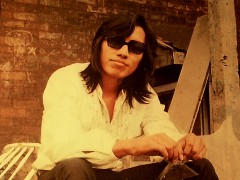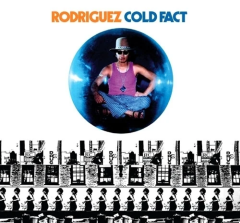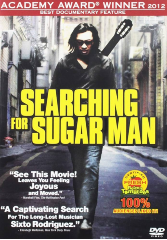Few artists have taken a more unusual route to fame than Sixto Rodrigez. Born on July 10, 1942, in Detroit, he was the sixth child of Mexican immigrant working-class parents. Sadly, his mother died when he was just three years old. His family had joined an influx of Mexicans who came to the Midwest to work in Detroit's auto industry. Mexican immigrants at that time faced both intense alienation and marginalization, and in most of his songs he would later write, Rodriguez took a political stance on the difficulties that faced minorities and the inner-city poor.
Consumed by music while growing up in Detroit, he dropped out of high school at the age of 16. Dividing his time between hanging around the Wayne State University campus and playing assorted unconventional clubs and bars, he was introduced to Harry Balk of Impact Records. This led to the recording of his first single, "I'll Slip Away," in 1967. Balk produced the single himself, which was released as by Rod Riguez, the name the Impact label gave him.  Rodriguez
Rodriguez
The single was unsuccessful and, shortly thereafter, Balk shut down the label and began a new career as a creative director at Motown. and Rodriguez would not record again for three years, but during that period session players and ardent Rodriguez supporters Dennis Coffey and Mike Theodore put him under the direction of Clarence Avant, who was in the process of setting up his Sussex label. Avant was genuinely impressed with Rodriguez's take on Detroit street life, and he supplied Theo-Coff Productions with sufficient means to cut an album's worth of material.
Theodore and Coffey played keyboard and guitar on the sessions, along with second-wave Motown Funk Brothers for a rhythm section. The pair recorded Rodriguez separately, and they matched his voice and acoustic guitar afterwards to a sonic palette of various orchestrations and psychedelic effects. The resulting album was titled “Cold Fact,” and it contained ten original songs by Rodriguez along with two co-written by Coffey and Theodore. I was Sussex's first release, a folk-rock classic with an otherworldly feel to it, but it failed to sell many copies.
Despite the poor showing of his debut, Avant offered Rodriguez the chance to record a follow-up in London with producer Steve Rowland and a studio band featuring guitarist Chris Spedding. Rodriguez penned all ten songs on the “Coming from Reality” album that was released in 1971. But after it again failed to click with the record-buying public, Rodriguez left the music business to take some college classes while working construction jobs to support his family.  Cold Fact LP
Cold Fact LP
Although Rodriguez remained relatively unknown in his home country, by the mid-1970s his albums were starting to gain significant airplay in Australia, Botswana, New Zealand, Zimbabwe and South Africa. When imported copies of his Sussex albums were sold out, an Australian record label, Blue Goose Music, bought the Australian rights to his recordings. Blue Goose released his two studio albums as well as a compilation album, “At His Best."
“At His Best” went platinum in South Africa, which at one stage was the major disc-press source of his music to the rest of the world. Rodriguez was compared to contemporaries such as Bob Dylan and Cat Stevens. Many of his songs carried anti-establishment themes, and therefore boosted anti-apartheid protest culture in South Africa. There his work influenced the music scene at the time and was also a considerable influence on a generation drafted, mostly unwillingly, to the then whites-only South African military.
Rodriguez’s performing career was dormant until 1979, when, much to his surprise, he was tracked down in Detroit by Australian promoters and requested to do some small theater shows in Down Under, coinciding with the surprising chart success of the re-release of his music there. Rodriguez performed two concert tours in Australia in 1979 and in 1981.
Rodriguez did no more recording, but he remained politically active and motivated to improve the lives of the Motor City's working-class inhabitants and ran unsuccessfully several times for public office: for the Detroit City Council in 1989, for Mayor of Detroit in 1981 and 1993, and for the Michigan House of Representatives in 2000.
After his daughter Eva learned about his fame in South Africa by discovering a website devoted to him, Rodriguez toured the country for the first time in 1998. A documentary film was made of the tour and was released in 2001 as Dead Men Don’t Tour: Rodriguez in South Africa 1998.  Searching for Sugar Man
Searching for Sugar Man
The 21st century saw an upsurge in the recognition of his talent in both the United States and Europe. His songs were being sampled and covered by a wide variety of artists, and “Cold Fact” was re-released in 2008 and “Coming from Reality” in 2009.
Rodriguez became a household name with the 2012 release of the documentary film Searching for Sugar Man, by Swedish director Malik Bendjelloul. The highly entertaining film detailed the efforts of two South Africa fans to see if his rumored death was true and, if not, to discover what had happened to him.
The film won awards at festivals in both the United States and Europe, and the “Searching for Sugar Man” soundtrack album was a compilation of Rodriguez tracks from his two albums along with three unreleased songs that were intended for a third album. In 2013, Searching for Sugar Man won the Academy Award for Best Documentary Feature.
Sixto Rodriguez continued to perform but glaucoma had drastically limited his vision which gradually led to blindness. He died in 2023 after suffering a stroke.
Sources:
Sixto Rodriguez by Quint Kik, All Music Guide
“The Best of Impact Records” CD liner notes by Jerry Schollenberger
Sixto Rodriguez, Cold Fact, Coming from Reality, and Searching for Sugar Man entries from Wikipedia

